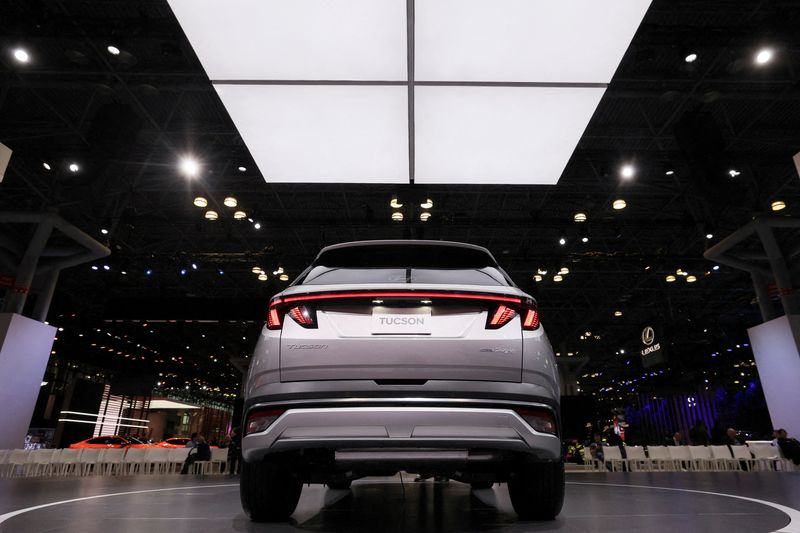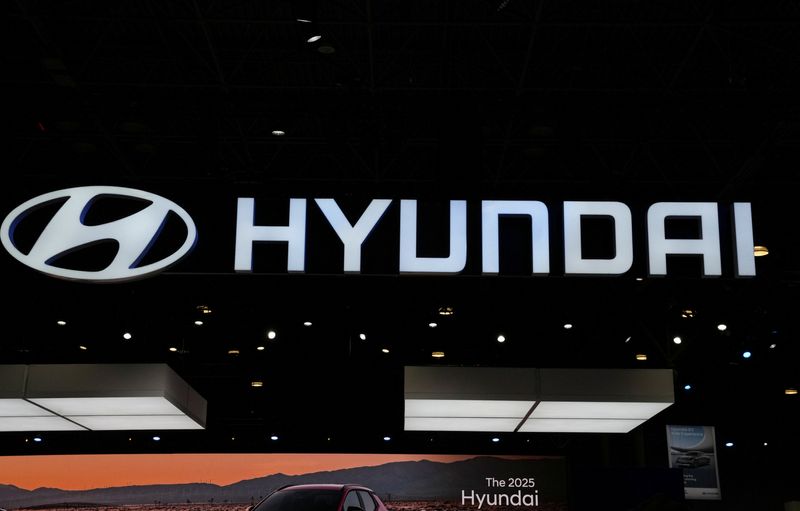By Heekyong Yang and Joyce Lee
SEOUL (Reuters) -Hyundai Motor said on Wednesday it was targeting annual global sales of 5.55 million vehicles by 2030, up 30% from 2023, as it plans to double its hybrid lineup to counter a slowdown in global electric vehicle (EV) demand.
The South Korean firm also said it would buy back up to 4 trillion won ($3 billion) of stock between 2025 and 2027 and pay a minimum of 2,500 won per share in quarterly dividends in a package that would return 35% of its profit to shareholders, up 10 percentage points from the current policy.
Shares surged as much as 5% after the announcement, having traded flat beforehand, with analysts saying its new shareholder return policy was higher than anticipated. They closed up 4.7%.
The world's No. 3 automaker by sales along with affiliate Kia Corp, kept its EV sales target of 2 million units by 2030, but raised its hybrid sales goal by 40% to 1.33 million units by 2028, as it laid out its medium- to long-term strategy at an investor day.
"Recently, the speed of conversion to electric vehicles has been slowing. As a result, demand for hybrids is increasing, and hybrids are becoming a basic option rather than an alternative to internal combustion engines," said Hyundai Motor (OTC:HYMTF) President and CEO Jaehoon Chang.
Hyundai said it planned to double its hybrid lineup to 14 models as it expected a surge in hybrid demand, especially in North America. It did not provide a timeline for the release of the new cars.
Hyundai could start producing hybrid cars at its new Georgia, U.S. plant in the first quarter of 2026, global Chief Operating Officer Jose Munoz told reporters, adding about one third of the plant's production capacity could be for hybrids when the factory is at full capacity.
MORE HYBRIDS
Hyundai's shift to focus more on hybrid vehicles, which combine an electric motor with a gasoline engine, is in line with moves by rivals Toyota (NYSE:TM) and Ford (NYSE:F).
But Hyundai is taking a different path from its global peers, expanding into a relatively new hybrid segment called the extended-range electric vehicle (EREV) that is popular in China, the world's biggest auto market, but has yet to gain traction globally.
An EREV uses a larger battery pack than plug-in hybrids and runs on electricity only, with its gasoline engine serving as a power bank to recharge the batteries when they run low.
Hyundai said it plans to begin mass production of EREV models in North America and China by end-2026 that would offer price competitiveness over EVs and a driving range of over 900 km (559 miles) when fully charged, hoping it would serve as a key bridge to full electrification.
In China, where Hyundai had a bruising setback due to intensifying competition from nimble domestic rivals, it aims to sell 30,000 EREV units by focusing on compact models. In the U.S., Hyundai aims for sales of 80,000 EREV units and will initially roll out large SUV models and the Genesis luxury brand.
The company also announced it will offer its autonomous driving vehicle platforms and technology to companies looking to manufacture such vehicles.
Hyundai, which posted record quarterly profit and revenue last month, said its improved shareholder return policy would be funded by its operations, as it targets a 9-10% operating margin by 2027 and over 10% by 2030.
"By launching hybrids, EVs, EREVs differentiated from other brands, we plan to improve both average profitability and operating margins for each powertrain," said CFO Seung Jo Lee.
"We will continue to pursue a profit-oriented strategy to achieve a mid- to long-term operating margin of 10% or more, which is the basis for the expansion of the shareholder return policy," Lee said.

It said it will update the market on where it will use the proceeds of an initial public offering of its India operation once the deal is completed. Sources have told Reuters Hyundai aims to raise around $2.5-$3 billion from the IPO.
($1 = 1,338.1300 won)
